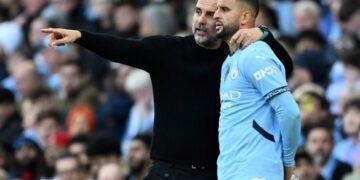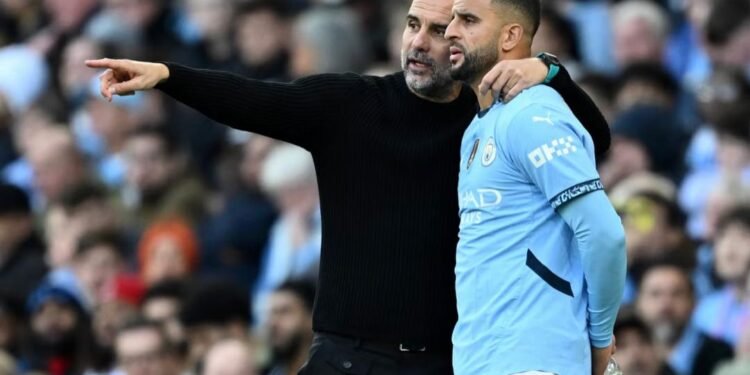A couple of years ago, Pep Guardiola took a phrase to a new dimension. Or a new era, given that it was a prediction for the 2050s. You’ll never beat Kyle Walker? “He will always have pace,” the Manchester City manager argued. “Kyle at 60 years old will be the fastest player in this room.”
Guardiola used to thank the full-back’s parents for his genes. Walker, it seemed, was a physiological freak. As others slowed down, as evidence sometimes emerged that his lifestyle was scarcely ideal, he was still the man for a race: with Vinicius Jr, or Kylian Mbappe, or the fastest forward anyone could find.
Until, it transpired, the name of Walker’s podcast felt ever more inappropriate. It was not merely that roadrunners like Adama Traore and Timo Werner could suddenly beat Kyle Walker; it was the ease with which they sped past him, the distance they opened up in the blink of an eye, the way lesser athletes found themselves in the unusual position of going past him. Walker was stripped of his super power, like Samson shorn of his locks.
Perhaps some of his confidence went with it. Certainly the imperfections in the rest of his game became more apparent. Walker had never needed to be positionally flawless; he was so quick he could cope. Until he couldn’t. He was beaten by Morgan Rogers for Aston Villa’s second goal in a 2-1 loss last month, at fault for both of Crystal Palace’s in a 2-2 draw, regularly susceptible, a shadow of the man whose swagger came from the knowledge he could outpace anyone at will. City’s recent mini-revival occurred without him: they have not won a game he has started since September.
And Walker, the player who may have begun the season imagining he would end it holding the Premier League or Champions League trophies, instead became the face of City’s sudden, undignified decline. If he gets his way, his campaign will end at another club altogether; he has asked to explore the option of a move abroad.
Maybe he is looking for a little respite. The Premier League now seems too fast for Walker. Guardiola, meanwhile, has belatedly admitted he should have been busier in the transfer market last summer. He probably should have bought a right-back.
Walker has been tempted by foreign climes before. He was close to joining Bayern Munich in 2023, even going as far as telling his teammates he was leaving, with complications in his particularly complicated private life providing a reason to leave Manchester. He was instead persuaded to stay over dinner by Guardiola and with a new three-year contract; City, who had been similarly reluctant to give Ilkay Gundogan a long-term deal, may now reflect each could only maintain his standards for the 2023-24 campaign, which the German spent at Barcelona anyway.
Walker had finished City’s treble campaign benched for the Champions League final against Inter Milan: cruelly, considering his vast contribution over his time at the Etihad, but a consequence of John Stones’ hybrid role. It was testament to Walker’s leadership that he nonetheless delivered a pre-match speech in the dressing room and further evidence of it when he emerged as Gundogan’s successor; in part because he seemed to want the armband and the status more than Kevin de Bruyne. But when City won the European Super Cup, Walker was surprised to be put on the high-pressure fifth penalty by Guardiola. He scored to secure the silverware and went on to become a Premier League-winning captain.
But his significance goes far beyond that. Walker joined City in 2017, in the summer of the £50m full-back, along with Danilo and Benjamin Mendy. Only one proved a success but it seemed that City were taking transfer fees for a previously unglamorous position to a new level. He had improved dramatically under Mauricio Pochettino at Tottenham but did so again after being reinvented by Guardiola.
Walker’s decline was so damaging, and he appears irreplaceable, because Guardiola’s masterstroke was to use his pace to recast him from an attacking full-back to a defensive one. Counter-attacks were City’s kryptonite. Walker became their ultimate insurance policy, the player who was too quick to be unleashed in the final third. He delivered 96 crosses in the Premier League in his final season at Tottenham, under 60 in each of his campaigns at City
But without that insurance policy, a common denominator in the worst spell of Guardiola’s managerial career was how often City were caught on the break, unable to recover after losing the ball upfield. It was the sort of scenario that long called for Walker’s recovery pace. For much of the previous seven years, the defining image of him is running back towards his own goal, winning a race.
Now his race looks run. There may have been hints. He was somehow named in the team of the tournament for Euro 2024, but his performance against Slovakia in the last 16 was awful. Gareth Southgate had borrowed from Guardiola, using Walker as the full-back who could cover for the central defenders. A byproduct of his brilliance at it was that Trent Alexander-Arnold started so few meaningful England matches in his preferred position under Southgate. If Alexander-Arnold is a unique right-back so, in a very different way, was Walker.
Now the possible end to his Premier League career has brought suggestions he is the division’s greatest player in his position, displacing Gary Neville from its all-time 11. It is a sign of how good Walker was. The problem for City is that Walker’s pace has gone at 34, at least 26 years before Guardiola thought it would, when neither he nor his manager was ready for it.










































